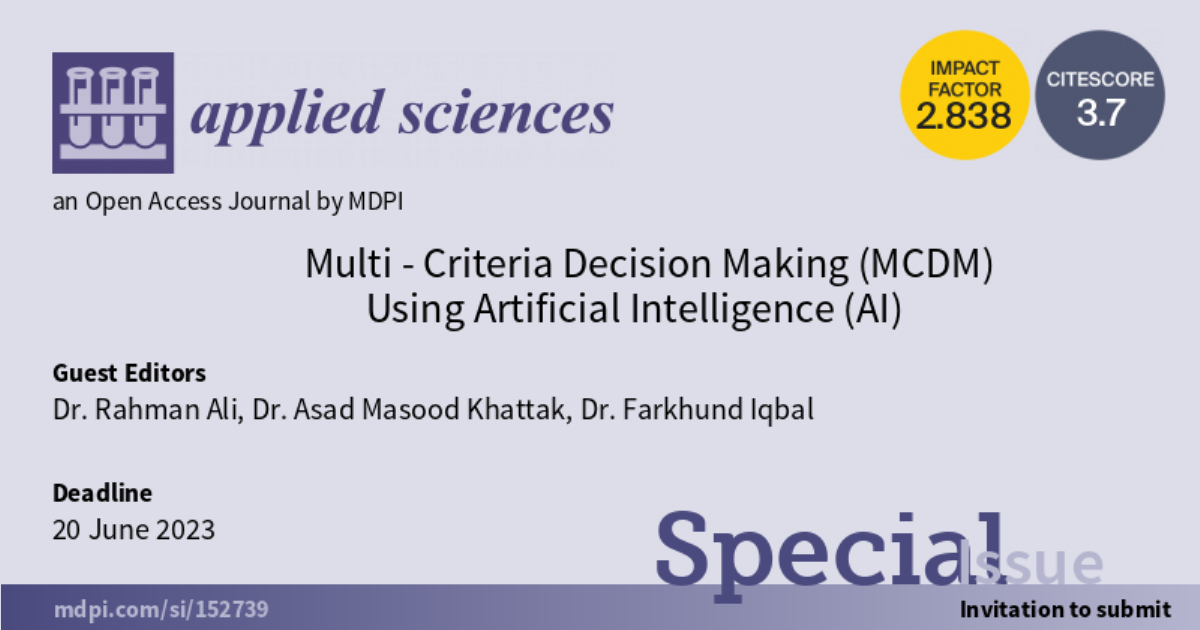Multi-Criteria Decision Making (MCDM) Using Artificial Intelligence (AI)
A special issue of Applied Sciences (ISSN 2076-3417). This special issue belongs to the section "Computing and Artificial Intelligence".
Deadline for manuscript submissions: closed (20 June 2023) | Viewed by 42380

Special Issue Editors
Interests: artificial intelligence; intelligent decision making; data mining; machine learning; reasoning and inference; recommender systems and natural language processing
Interests: semantic web; data mining; context-aware computing; secure computing; smart cities
Special Issues, Collections and Topics in MDPI journals
Special Issue Information
Dear Colleagues,
Organizations face problems during the process of complex decision making in multifaceted situations where multiple criteria and factors are involved. Real-world decision-support systems require consideration and analysis on the basis of multiple criteria which, in turn, affect the final decisions. Researchers concerned with the design and development of intelligent decision-making systems hunt for innovative scientific techniques, tools and models to improve the quality of the anticipated decisions.
To achieve this goal of improved decision making, multi-criteria decision making (MCDM) and artificial intelligence (AI) techniques have recently been extensively practiced by researchers. As a result, significant improvements have been observed in decisions for a wide range of real-world complex problems. The integration of MCDM and AI offers new competencies to the configuration of complex decision making in different environments (e.g., static and distributed). These comprise the management of large datasets, the construction and modelling of innovative decision models, and the development of effective computational optimization algorithms for problem solving.
This Special Issue aims to solicit high-quality original research and review articles that cover novel, cutting-edge technologies and methods concerned with the scientific design, development and implementation of decision-support systems on the basis of MCDM and AI.
Potential topics include:
- Intelligent decision-support technologies;
- Data mining models for decision making;
- Evidential reasoning;
- Machine learning and deep learning models for decision making;
- Evolutionary multiobjective optimization;
- Fuzzy modelling;
- Computational intelligence in MDCM;
- Multi-criteria models for intelligent decision support system (IDSS) assessment;
- Multi-attribute decision support;
- Rule-based approach to multicriteria decision making;
- Application of evidence theory in MCDM;
- Multiobjective optimization problems;
- Fuzzy multiobjective optimization;
- Applications of the mentioned techniques across a wide range of areas, including, business, healthcare, education, industry, research, management, engineering, etc.
Dr. Rahman Ali
Dr. Asad Masood Khattak
Dr. Farkhund Iqbal
Guest Editors
Manuscript Submission Information
Manuscripts should be submitted online at www.mdpi.com by registering and logging in to this website. Once you are registered, click here to go to the submission form. Manuscripts can be submitted until the deadline. All submissions that pass pre-check are peer-reviewed. Accepted papers will be published continuously in the journal (as soon as accepted) and will be listed together on the special issue website. Research articles, review articles as well as short communications are invited. For planned papers, a title and short abstract (about 250 words) can be sent to the Editorial Office for assessment.
Submitted manuscripts should not have been published previously, nor be under consideration for publication elsewhere (except conference proceedings papers). All manuscripts are thoroughly refereed through a single-blind peer-review process. A guide for authors and other relevant information for submission of manuscripts is available on the Instructions for Authors page. Applied Sciences is an international peer-reviewed open access semimonthly journal published by MDPI.
Please visit the Instructions for Authors page before submitting a manuscript. The Article Processing Charge (APC) for publication in this open access journal is 2400 CHF (Swiss Francs). Submitted papers should be well formatted and use good English. Authors may use MDPI's English editing service prior to publication or during author revisions.
Keywords
- artificial intelligence
- multi-criteria decision making
- intelligent decision making
- intelligent decision-support systems
- machine learning
- data mining
- deep learning
Benefits of Publishing in a Special Issue
- Ease of navigation: Grouping papers by topic helps scholars navigate broad scope journals more efficiently.
- Greater discoverability: Special Issues support the reach and impact of scientific research. Articles in Special Issues are more discoverable and cited more frequently.
- Expansion of research network: Special Issues facilitate connections among authors, fostering scientific collaborations.
- External promotion: Articles in Special Issues are often promoted through the journal's social media, increasing their visibility.
- Reprint: MDPI Books provides the opportunity to republish successful Special Issues in book format, both online and in print.
Further information on MDPI's Special Issue policies can be found here.






